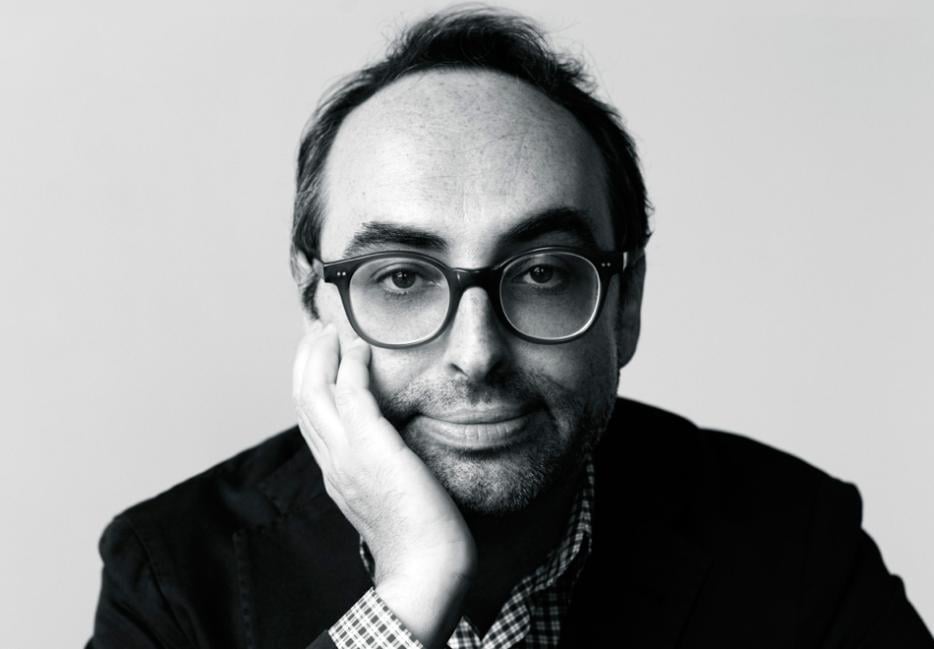In the introduction to Avital Ronell’s experimental text The Telephone Book, she explains (and explains might be too concrete a term) that “your mission, should you choose to accept it, is to learn how to read with your ears. Respond as you would to the telephone, for the call of the telephone is incessant and unremitting. When you hang up, it does not disappear but goes into remission.”
Novelist Gary Shteyngart’s iPhone lies on the table between us, darkening and coming alive again with notifications; he glances at it—warily, I project—but doesn’t respond. Known for his crypto-Soviet, Jewishly surreal sense of wit, Shteyngart seems to write with the sense of the unremitting call that Ronell references. Sometimes the call is literal; his most recent novel, Super Sad True Love Story, is set in a near-future global village, where a fictional device called an Äppärät keeps characters hyperbolically connected. And sometimes it’s less tangible, a series of personal questions about himself, his family, and his legacy that, Shteyngart admits, has taken him four books to answer. The tension between Shteyngart’s Russian and American identities impels him to create slightly different versions of himself in every book—less an act of narcissism than a desire to answer the ontological question that dogs him, yeah, unremittingly.
In his first novel, The Russian Debutante’s Handbook, Shteyngart told a whimsically biographical story of a young Russian American named Vladimir Girshkin, who bumbles around New York before fleeing to the fictional city of Prava. His second novel, Absurdistan, introduced a minor character named “Jerry Shteynfarb,” known and moderately reviled for his novel The Russian Arriviste’s Handjob. And then came 2010’s Super Sad, which again placed a Shteyngart-esque figure in a world just slightly adjacent to this one.
The refractions, echoes, and inversions of Shteyngart’s fictional work are all present in the newly published Little Failure, a meticulously detailed account of his childhood in Leningrad and second life after immigrating to the US. Even more than in its the three fictive precedents, Little Failure reveals—in alternately comic and agonizing chapters—a man riven and unified by his multiple identities. This is the other theme in Shteyngart’s work: the very narrow divide between pain and humour. Perhaps the first thing Shteyngart is known for is his absurdly funny, almost clownish lack of vanity. (See the trailers for Super Sad True Love Story and now Little Failure—both of which feature notable appearances by his former student, celebrated weirdo James Franco.)
The iPhone trembles and glows, and reluctantly Shteyngart picks it up, taps something out, hits send. He mumbles something wry and inaudible about Twitter before placing it carefully in front of him, observing its temporary silence. Listening with his eyes. And then I ask him my first question.
How do you keep your energy up while on tour?
I dunno, I want to try coke again. I haven’t since I was in my 20s... but I think it beckons.
(laughter)
Little Failure is a memoir, but you’re currently 41 years old—
I think 41 in Russian years is more like 67—
What made you to want to write a detailed, non-fiction retrospective at this point in your life?
With books, you don’t choose. They sort of choose you. I’d written three satirical novels with these Russian-Jewish nebbish protagonists—nebbish is a Yiddish word that denotes Woody Allen. I was working with the same kind of character and I finally thought "It’s time to lay the cupboards bare,” which would mean writing a memoir. Now there’s nothing left. I have to write about a whole different character in the next book.
How would you describe Little Failure?
It’s about an asthmatic boy in the Soviet Union who learns how to breathe and write. He shows up in America in ‘79, gets called Red Gerbil, Red Hamster, you know—all the things that one got called back then for being a Russkie and a Commie and all that. Slowly morphs into a Republican—oh God!—and then thankfully morphs into a stoner; discovers psychoanalysis and slowly waddles out of all these different identities and becomes semi-sane and... profitable.
Does the Gary character in the book seem separate from you? Does he feel like someone other than yourself?
No, I’m just trying to use the third person.
No, no—it’s just that I think it’s interesting—
Yes, so does my analyst—
It’s interesting to be sitting in the room with you after reading about this seemingly “other” Gary.
Well, yes. In this very schizophrenic way, I’ve been through so many personalities and nicknames, including Little Failure, that there is a kind of other personal quality when I was writing this book and when I finished it. I thought “Oh my god, I can’t believe I’ve worn all these different hats.”
Did you feel in some way like you were able to exorcise some of those titles given to you by others?
Exorcise, but also exercise. Like, in college, people called me Scary Gary because I could smoke more pot than anyone else—which was a prodigious feat at Oberlin, believe me.
Little Failure was something that your mother called you.
It was a hybrid of English and Russian—Failure-chka, which uses the English word “Failure” and adds the diminutive, so it becomes “Little.” Chka.
So it’s kind of... cute.
It’s very cute.
A great part of the book is you describing in detail your childhood and your relationships with your family. You recently had your first son. Were you writing the book as you were preparing for fatherhood?
Yes. I wanted to be a father who would know about his own relationship with his father, so writing this book and thinking about becoming a father were happening almost simultaneously. I wanted to take all the good things I had from my father. The way he would tell me these stories as a kid, he really inspired me to become a writer with his Planet of the Yids tales that he’d tell, walking around Kew Gardens, Queens. Planet of the Yids was something he made up: the Jews had their own planet that was constantly under attack by Slavs with pork torpedoes. Stuff like that I wanted to keep, but I also wanted to have a different upbringing. Having grown up in the Soviet Union, my father had a more 19th century view of how to raise a kid, whereas I hope to be a progressive 21st century North American dad.
So, no slaps across the neck.
No, no slapping. And fewer casual insults.
In the book, it seems like you came to understood that his behavior was caused by… complex emotions, like envy—
Envy, perhaps, but also—my father’s first memories [included] diving under a train that the Germans were bombing, and then finding out that his father was killed in WWII—and this was when he was a three-year-old. Then his best friend [also aged three] died next to him. It just went on and on and on; being raised by a horrific stepfather who was very violent; hiding under the table and singing opera to himself to try and feel better; dreaming that his father was still alive. In writing this book, the dominant emotion went from anger and rage, to sorrow for him and my mother. Feeling like, my God, I wish you’d grown up in a better country in a saner time. Maybe he could’ve been the opera singer he wanted to be if he’d grown up in Toronto or something. (Laughs [sadly]). He would’ve had a chance, which is something he didn’t have in Russia, being Jewish and a host of other things.
What’s the difference between talking about Little Failure versus your last novel, Super Sad True Love Story?
In writing this, I couldn’t hide under the cover of satire. Satire is very good that way. I think satirists are just frustrated romantics who want the world to be a certain way and are deeply unhappy that it’s not. Super Sad was a dirge for the decline of reading and literary culture in America, the invasion of technology as a kind of religion—the decline of the United States middle class in general. These are all important things to me, but they’re much more abstract. Little Failure is about my family. There was no cover in writing this.
One of the things that I really connected to was the current of illness and asthma, and the isolation that came from being bedridden. Or couchridden—
Yes, couchridden. We couldn’t afford a bed!
In a way, it sounds like that marked the beginning of your “artistic identity.”
I’m all for “If you want your kid to be an artist of any stripe, make sure that she or he has all the good diseases that keep her in bed.” Asthma’s wonderful—especially so in the Soviet Union because there were no steroid inhalers. When we got to Vienna on our first stop out of Russia, we saw a doctor who told us about these things called inhalers. “So you don’t have to call the ambulance again," which we always had to do in Russia. You don’t even need to make up a metaphor for coming to the West—I could breathe on the first night I flew out of Russia.
There is a part in the book where you mention that you still think and dream in Russian, which I found so shocking because your English is so deft and funny and fluent. It’s amazing to think that there’s a completely different language by which you experience things internally.
It’s wonderful to have that. You see so many writers who are bilingual from birth. It just adds a whole new dimension because there’s this other soundtrack that’s playing—especially when you’re writing characters who are thinking and speaking and dreaming in Russian. I’m so glad my parents spoke Russian in the home, because that way I was able to maintain it.
Nabokov’s a great example of an author whose first language wasn’t English, but then wrote these books [in English] that were so experimental and advanced.
Although with Nabokov, he had an English governess and a French governess, so he grew up in a sense trilingual. It was foreign language to him, and yet it wasn’t. At Columbia [where Shteyngart teaches], I often get students who were, say, educated at the American School in Tokyo. Much more so than I am, they are perfectly bilingual, speaking their native tongue but also perfect vernacular American English as well. I can see how that helped push them into becoming writers—constantly having this schizophrenia, this dialogue between different halves of yourself. So much of literature thrives on conflict—the idea of multiple things opposing one another—and that’s why I think it helps people who grew up bilingual to become writers and commentators on their adopted culture.
You teach creative writing at Columbia, and I wondered if you found your students questioning, or worried about the possibility of pursuing a career as a creative writer.
I’m sometimes shocked that they’re not, because literary fiction in the States is this bizarre industry/art form, where the number of artists keeps rising and the size of the audience keeps shrinking. I’m no economist, but supply and demand has to factor into this at some point. What I’m scared of is the poetry model—which is read only by the people who practice it. [In the US] we have probably 400 MFA programs in poetry that are hard to get into, and the people who write poetry are primarily the people somehow affiliated with those universities. There are a few poets with somewhat wider audiences, but it’s still very tiny. I don’t want literary fiction to be what poetry is; I mean, I don’t want poetry to be what poetry is. But I’m worried that literary fiction in moving towards being read by very few people. The quality of it is exceptional these days. There are such wonderful new writers, Sheila Heti is just spectacular, David Bezmozgis—so many great writers running around the place. And now we’ve got to make sure there are enough readers for them. What you want is for reading to boom across the land as it did during the golden age of American literature. In the ‘40s and ‘50s, where you couldn’t be an educated person, or even an uneducated person, and not have an idea about J.D. Salinger or Mary McCarthy. These were the things you grew up with.
Why and to where do you think our attentions have shifted?
The need for stories is always there, but what is the water cooler conversation now? It’s beautiful shows like Breaking Bad, or Mad Men, or Girls. That’s where it’s migrated, and I’m not against any of that—in fact, they’re trying to turn Super Sad into a TV series. I love those shows. But I do feel that because they satisfy a certain need for narrative, they’ve pushed books out of the way. Also, our attention span has shrunk to such an extent and it’s harder to concentrate on text for a very long period of time, especially when it’s not on a screen. People lack that capacity. I lack that capacity. I was doing a reading in upstate New York, way up in the mountains, and I started out from New York, of course checking my iPhone while trying to read a beautiful Chinese novel in translation. I had so much trouble getting into the book because it was in a different culture with all these other signifiers. Meanwhile, the iPhone is just pinging with messages and I’m answering and tweeting like crazy, all while trying to read this book. Then we got into the mountains and the signal died, and when the signal died, I remembered what it’s like to read a book and I started really getting into the book. I started inhabiting the world of the book until everything else was crowded out except for the book and the characters in it. I thought “So that’s what reading is.” Fifteen years ago, that was how I read. Now I have to end up surrounded by mountains to do it. I do this professionally—what is it like for the casual reader.
Maybe there should be sporadically enforced power outages to allow for that kind of concentration.
In Super Sad, everyone has the device called an Äppärät that controls their entire life the way an iPhone does, but even more so. At one point in the book, we find out that high net-worth individuals don’t actually have them. I think not being plugged in is a new kind of luxury. It’s a luxury not to be connected, to be able to have an introspective moment to yourself.
So now that you’ve got the memoir out of your system, do you think you can get away from the neb... the nebbish? the neb—
“The Neb,” that’s good. That’s a great term.
I’m Jewish, I should know this.
You’ve never heard nebbish before?
I’ve heard it—I just didn’t know it was the noun.
We use it all the time in New York.
Okay.
“That is one hot neb.”
So now you’ve rid yourself of the nebbish/neb—where do you feel that might let you go next?
I’ve always wanted to do a book about the world today set in Shanghai, Mumbai, Dubai. All the “-ais.” And have as a protagonist a woman, from a different culture.
Crazy!
CRAZY, I know. Well, in Super Sad, I loved writing from the perspective of Eunice Park, the Korean American 24-year-old. I had so much fun with Eunice. I wanted to make her a deeper character as the book went on. She starts out very frivolous... all she does is shop online all day long. But I enjoyed writing about another culture so much, another gender, and I’d love to do that again with the next book. But I also want to do a thriller—a contemporary literary novel with lot of plot, you know? Could be a disaster, but it would be fun to try. I like plot, I’m old-fashioned that way. I still think things should happen in a book. Although what writer was it who said, “Plot is an embarrassment”? I can’t remember, but it was a 20th century novelist.
“Plot is an embarrassment,” eh? I’ll look that up. And I’ll make it sound like I knew spontaneously because I’m just that quick. People will be wildly impressed.*
Yes!
Out of curiosity, I know you barely tolerate Canadian writers—
(Laughs) I was in a drunken stupor! I apologized many times, which I think was a very Canadian thing for me to do, to apologize profusely on Twitter. The bigger thing that I was trying to say – again, we were drunk – comparing arts grants, and in some ways MFA programs too, where someone’s paying for something and there’s an expectation that produces a different kind of work, maybe. Not necessarily, but it could. Whereas the free capitalist world expects nothing of you. I wrote most of The Russian Debutante’s Handbook before doing an MFA program, and it was harrowing. Nobody was supporting me. But that lack of support gave me a freedom to do whatever I wanted.
Oh I know, I was kidding. You’ve cited a number of Canadian writers in this interview alone, and you’ve mentioned elsewhere your admiration of Alice Munro. Sheila Heti—
Who now lives with us—
What? Nooo, no.
But she’s always around Columbia!
She’s taught at Columbia, and spends a lot of time in New York. (Sternly) But she lives here.
I thought she had defected to our literary paradise. Richler, by the way is another huge—I teach him in my Hysterical Male seminar. Maybe that was the thing when I was a judge at the Giller; we had no problem finding a winner and many other top writers out of that big pile, but the lack of humour was a little strange. Mordecai Richler was the funniest writer I think I ever read. Barney’s Version is the funniest book on mortality I’ve ever read. So, I was hoping that when they told me I would get 140 Canadian books, there would be some heir to that tradition. Maybe she or he is out there, but it didn’t land on my lap this time and left me itching for more... funny.
That makes sense.
Just be funny, Canada. With Rob Ford, I think a line has been crossed into insanity that will hopefully create the demand for somebody to provide a literary answer to all this. I’m waiting for the big Rob Ford novel. If we had a Rob Ford in America—and I wish we did somewhere far away from New York—if we had a Rob Ford, there would be so many candidates for writing the novel, because that kind of absurdity thrives in the United States. The United States is, Rob Ford excepted, a much more absurd country, because it’s a very unequal country. Literature thrives in environments where there is a lot of pain. There’s a reason why 19th century Russian literature was so amazing, and early 20th century American literature. These were countries that had a lot of sorrow in Russia’s case, or a lot of dynamism in the American sense. But Canada’s a lovely country, and that’s not necessarily great for literature, [given the premise that] great inequality produces good literature. But having someone like Rob Ford for me is a signal that something’s not right in this society, something’s very wrong, and that’s very encouraging for the arts. Not very encouraging for the average citizen, I guess.
*A rigorous Google search leads me to believe that Shteyngart is quoting himself.
Listen to our interview with Shteyngart on the Hazlitt podcast, The Arcade.






